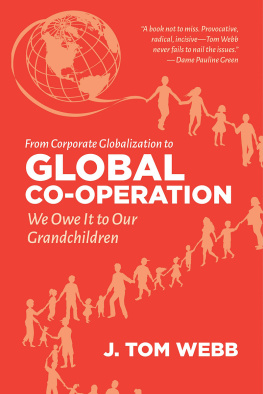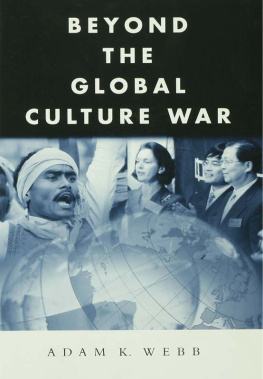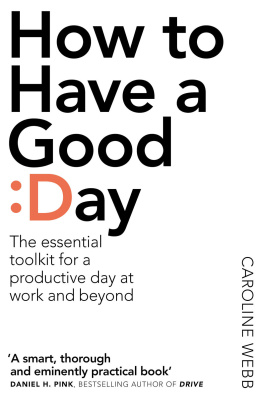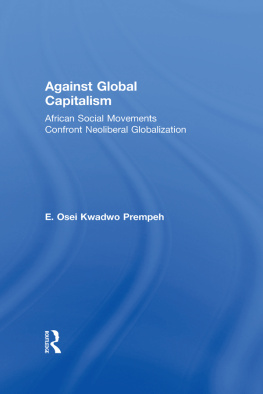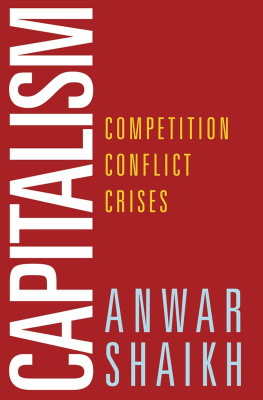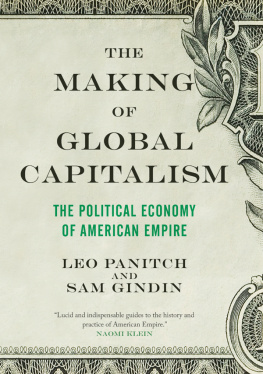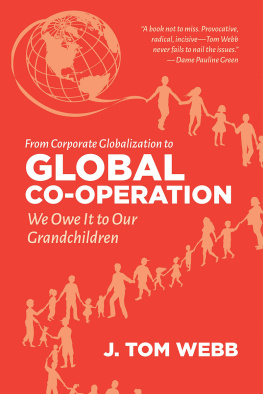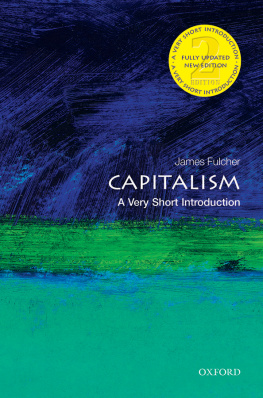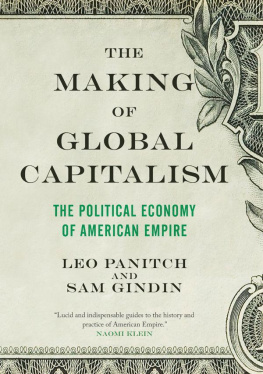Praise for From Corporate Globalization to Global Co-operation
This is a book that not only experts, but also concerned citizens should read. With outstanding clarity the author shows the enormous degree to which conventional economics is alien to the real world. If economics were a science, economists would behave like scientists. That is; if a theory proves to be wrong, the scientist immediately starts searching for an alternative. This is exactly what conventional economists never do. No matter how disastrous an economic situation may be, the answer is always more of the same. Thatchers TINA (There is no alternative) is the most dramatic case that has done so much damage to the world. But an additional value of the book is the true alternatives for a New Economy that the author brilliantly offers. After reading the book, one feels that, after all, a better world is possible.
Manfred Max-Neef, Universidad Austral de Chile.
We all know something is fundamentally wrong in our world, wrong in a way that requires a deep transformation in our thinking and behaviour. Tom Webb offers a path to another future, one based on co-operation and respect for the whole of creation. A lovely book.
Maude Barlow, National Chairperson of the Council of Canadians and winner of the 2005 Right Livelihood Award.
A book not to miss. Provocative, radical, incisive
Tom Webb never fails to nail the issues.
Dame Pauline Green,
past president of the International Co-operative Alliance.
Tom Webb is a passionate visionary and he is surely right in the core claim of this important book, that the world needs co-operation now more than ever.
Edward Mayo, Secretary General of Co-operatives UK.
The journey this book offers asks the reader to pack two items: a belief that we can build a healthier and more equitable world, and a willingness
to be of open mind and heart to drive the innovation and
creativity that diverse thinking creates.
Kathy Bardswick, President and CEO of the Co-operators.
The market system that triumphs over most of the Earth today is a clear danger to the health of many life forms, including human societies. In describing his lifelong commitment to co-operatives as an alternative approach to production, Tom Webb offers hope for movement toward a realistic
alternative economic/social system. This books offers practical,
experience-based information on how to understand the co-operative movement and how to help it expand its influence.
Dr. Neva R. Goodwin, Co-Director, Global Development and Environment Institute, Tufts University.
This will be a very useful book for those who want to know about co-operation but also for those inside co-operation who wonder how to fix up the problems that co-operatives sometimes face. We particularly agree on the books premise, that co-operation is based on an anthropological assumption that is opposite to that of the mainstream, namely the innate goodness of people
who practice the golden rule of reciprocity. Those people must
have appropriate institutions to express that golden rule and
not be constrained into egoistic structures.
Dr. Stefano Zamagni and Dr. Vera Negri, University of Bologna.
Many voices are calling for wide-ranging changes to our economic, social and political systems. They are driven by concerns about rising inequality, the destruction of nature, and the undermining of democracy resulting from increasing global corporate power. Tom Webbs important contribution stands out from the crowd because of his impassioned, informed and
inspiring advocacy of the co-operative business model as an essential
feature of any successful alternative to the current system of ailing
capitalism and its dependence on endless economic growth.
Peter A. Victor,
author of Managing Without Growth: Slower by Design, Not Disaster .
Tom Webb delivers a collection of reflections about humanity in disconnect with its economic life. His unwavering trust in people and co-operation come through in every chapter, as does the sorrow in witnessing our civilization melt away at our collective fingertips. A mix between observation and hope, the book is a legacy of a true visionary co-operator who, by stating the obvious, always points out to everything we, humans, take for granted.
Sonja Novkovi, Saint Marys University.
From Corporate Globalization to
GLOBAL CO-OPERATION
From Corporate Globalization to
GLOBAL CO-OPERATION
We Owe It to Our Grandchildren
J. TOM WEBB
FERNWOOD PUBLISHING
HALIFAX & WINNIPEG
Copyright 2016 J. Tom Webb
All rights reserved. No part of this book may be reproduced or transmitted in any form by any means without permission in writing from the publisher, except by a reviewer, who may quote brief passages in a review.
Editing: Brenda Conroy
Cover design: John van der Woude, inspired by a drawing by the author
Photos: CanStock
eBook: tikaebooks.com
Printed and bound in Canada
Published by Fernwood Publishing
32 Oceanvista Lane, Black Point, Nova Scotia, B0J 1B0
and 748 Broadway Avenue, Winnipeg, Manitoba, R3G 0X3
www.fernwoodpublishing.ca
Fernwood Publishing Company Limited gratefully acknowledges the financial support of the Government of Canada through the Canada Book Fund, the Manitoba Department of Culture, Heritage and Tourism under the Manitoba Publishers Marketing Assistance Program and the Province of Manitoba, through the Book Publishing Tax Credit, for our publishing program. We are pleased to work in partnership with the Province of Nova Scotia to develop and promote our creative industries for the benefit of all Nova Scotians. We acknowledge the support of the Canada Council for the Arts, which last year invested $153 million to bring the arts to Canadians throughout the country.

Library and Archives Canada Cataloguing in Publication
Webb, Tom, 1946-, author
From corporate globalization to global co-operation:
we owe it to our grandchildren / Tom Webb.
Includes bibliographical references and index.
Issued in print and electronic formats.
ISBN 978-1-55266-872-6 (paperback).--ISBN 978-1-55266-874-0
(kindle).--ISBN 978-1-55266-873-3 (epub)
1. Cooperative societies. 2. Social entrepreneurship.
3. Capitalism. 4. Globalization. I. Title.
HD2963.W42 2016 334 C2016-903193-4
C2016-903194-2
Contents
I dedicate this book to those, except for whom, it would never have been written:
Marion, for her love and support
My parents, whose love and values nurtured my spirit
My beloved children and grandchildren and future generations, who deserve a better world
ACKNOWLEDGEMENTS
This book was written in the hope that its ideas will help make this a better world. At my age, I have little to gain from these ideas, but I know that the shape of the world that is unfolding will be of immense importance to our children and grandchildren and future generations. As a species, we are spiritually bound to generations past and to come. Their dreams and hopes are connected to us. In a healthy society, we live for ourselves and for them. The book is written for us but also very much for them.
My parents left me a better world than the one they grew up in, amidst World War I, the Great Depression and World War II . They instilled in our family strong values and ethical reflection. I hope we have done the same for our children, but I fear the world we are leaving them is not improved, but seriously diminished. My belief that there can be a better world began with my parents and family. My brother, Jim, who served as a Jesuit priest in Jamaica for more than twenty years, also had a powerful influence on my thinking. He had a deep commitment to social justice and lived out a preferential option for the poor, day by day. His focus on education, justice, co-operative development and peace was evident not only in what he preached but in the way he lived, and in his deep love for the people of Jamaica. He dedicated his life to making a better world.

